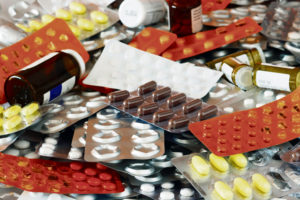 The quality of our tap water is very good, but studies show an increased amount of medicinal products in our water supply. More and more residues of medications and other potentially dangerous substances are being detected in surface waters. This is an alarming fact and we want to take the opportunity to provide information on what you can do to reverse this trend.
The quality of our tap water is very good, but studies show an increased amount of medicinal products in our water supply. More and more residues of medications and other potentially dangerous substances are being detected in surface waters. This is an alarming fact and we want to take the opportunity to provide information on what you can do to reverse this trend.
How do pharmaceutical residues get into our waters?
There are two primary ways in which we affect the amount of medicine in our drinking water – indirectly through regular use and through improper disposal.
Medicines are not fully absorbed by the body. In part, they are chemically unchanged when excreted. Ointments are rinsed off the skin when washing. In this way, via municipal sewage, large amounts of pharmaceutical degradation products are emitted into soil and water with human and animal excretions.
Alternatively, many people do not know how to properly dispose of their unused or unwanted medications. Carelessness and incorrect disposal of drugs down the drain or toilet increase the concentration of this chemical cocktail in our waste water.
Most sewage plants are not yet designed to absorb, convert, or bind medications diffused in the wastewater. Subsequently, the amount of pharmaceutical residues in streams, rivers, and lakes is constantly increasing. To a certain extent, they can even be found in drinking water. Drug residues in our water supply can potentially affect our health, and have a very negative impact on microorganisms and other wildlife.
It is very difficult to biologically degrade medicinal products. Once they have entered the water cycle, they are hard to remove. This makes it even more important that we reduce the release of medicinal products in the environment as much as possible.
How to safely dispose pharmaceuticals:
Utilize the information found at https://arzneimittelentsorgung.de/home/ to ensure you dispose of medications in accordance with local ordinances
If your county allows disposal in the black bin (residual waste), please wrap it in a newspaper or paper bag, put it into a waste bag to prevent spillage in case of tipping over of the bin, tie up the bag and throw it into the bin.
Never dispose of unused medicine down the drain or toilet!
If the package insert contains a specific note (e.g. for cytostatic agents in cancer drugs), do not dispose of these drugs in the black bin, but take them to the hazardous waste truck (Umweltmobil) or the ZAK recycling center. By doing so, you can prevent unauthorized access by third persons. These items can also be dropped off at one of the two AF Recycling Centers located on Ramstein and Kapaun.
Remove tablets from their cardboard, plastic, or blister packs and put them in your black bin (residual waste), if allowed by local ordinance. Recycle the packaging by placing it in the appropriate recycling bin.
When disposing of objects with points or sharp edges (glass ampoules, syringes, etc.), you should use a non-penetrable container with a screw cap and then but the container in the black bin. Sharps disposal containers are available by prescription at the Ramstein Air Base pharmacy.
If you are unsure whether a certain medicine is considered non-recyclable waste, you always have the option to take it to the ZAK recycling center or the hazardous waste truck.
Ramstein Air Base pharmacy has a medication disposal bin. You can take unwanted/expired medications there for appropriate disposal. These medications may be left in their original containers.
While pharmacies are not obliged to take back unused or expired drugs, some offer this customer service on a voluntary basis.
To avoid excess drug residues in our water supply, it is vital to act responsibly when handling medicinal products. Please check your supplies for non-expired medicines before buying new products. This way, you can avoid medical waste before it occurs.
For more information, you can contact the 86 CES Environmental office at 478-8406 or via email 86ces.cea@us.af.mil


